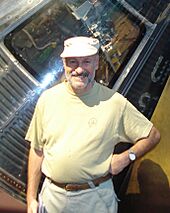Julio Ángel Fernández facts for kids
Julio Ángel Fernández Alves, born on April 5, 1946, is a famous astronomer and teacher from Uruguay. He works in the astronomy department at the Universidad de la República in Montevideo. He is also part of important science programs in Uruguay, like PEDECIBA, which helps develop basic sciences. From 2005 to 2010, he was the Dean of the Faculty of Sciences at the Universidad de la República. An asteroid discovered in 1983, called 5996 Julioangel, was named after him!
He is an active researcher in Uruguay's National System of Researchers. He is also a member of the National Academy of Sciences in the United States.
Discovering the Kuiper Belt
In 1980, Julio Fernández had a big idea about comets. He wrote a paper called On the existence of a comet belt beyond Neptune. In this paper, he suggested that many comets that visit the inner Solar System come from a special area. He thought this area was a belt of comets located far beyond Neptune, around 50 times farther from the Sun than Earth is.
Scientists later used computer models to test his idea. These models supported what Fernández had proposed. This led to the discovery of what we now call the Kuiper belt. The Kuiper belt is a huge ring of icy objects beyond Neptune. David Jewitt, one of the astronomers who discovered the belt, believes that Fernández deserves a lot of credit for predicting it. Julio Fernández has written many more papers about the objects found in this distant part of our solar system.
Defining What a Planet Is
In 2006, astronomers had an important meeting to decide what a "planet" truly is. Julio Fernández was one of the scientists who had different ideas about this definition.
The first idea for the definition included Pluto, its moon Charon, and Ceres as planets. But Fernández and his Uruguayan colleague, Gonzalo Tancredi, suggested a different way to define a planet. They believed that a true planet should be big enough to have "cleared its neighbourhood" of other smaller objects around its orbit. This means it has become the main object in its path around the Sun.
They suggested that objects that are round but haven't cleared their orbits should be called "planetoids." The final definition chosen by the IAU (International Astronomical Union) was very similar to what Fernández and Tancredi proposed. However, instead of "planetoids," these objects were named "dwarf planets." This decision led to Pluto being reclassified as a dwarf planet. The word "Plutoed," meaning to be demoted or downgraded, even became the "word of the year 2006" because of this event!
See also
 In Spanish: Julio Ángel Fernández para niños
In Spanish: Julio Ángel Fernández para niños
 | Toni Morrison |
 | Barack Obama |
 | Martin Luther King Jr. |
 | Ralph Bunche |


